The high-pitch campaign to enforce lockdown is making society’s vulnerable sections to pay for attempts to earn livelihoods for their desperate families, reports Minhaj Masoodi

Two days ahead of Eid-ul-Fitr, Faizan (name changed), 25, along with his colleague was travelling towards their office when cops stopped them at a checkpoint in Shopian outskirts.
The Jammu and Kashmir government had announced the lockdown on April 29, to arrest the spread of Covid19. With lockdown in place, they still decided to take the risk.
“We were asked for a curfew pass,” said Faizan. “But we did not have one.”
Without any warning or seeking clarification, cops allegedly dragged both of them out and smashed the side mirror of their car. Abused and beaten to a pulp, Faizan and his colleague were then bundled into the police van and taken to the police station.
“We were lodged at the police station. Our phones were taken away and we were not even allowed to call our parents or given access to landline phones at the police station,” said Faizan. “We only got assurances that we would be allowed to talk to our families.”
Faizan and his colleague spent the night in the police lock up despite their protestations. He said that he kept kicking the door but in vain. “I kept banging and kicking the door asking for my release.”
While the government has been strict about following the SOPs and other Covid protocols such as wearing masks and physical distancing, Faizan said that the room they were locked up in, was overcrowded.
“We were put in a 15 x 12 room along with 13 other people. No one was wearing a mask, no SOPs were followed. Even cattle are treated better than this,” Faizan said, insisting that they were forced to sleep in the same cell like cattle. “Initially, I was worried about contracting the virus. But after some time, I got frustrated and removed my mask, sat down and started sobbing.”
“There was very little space. We had to rest our legs on each other’s bodies. There was no room to move our bodies while sleeping.”
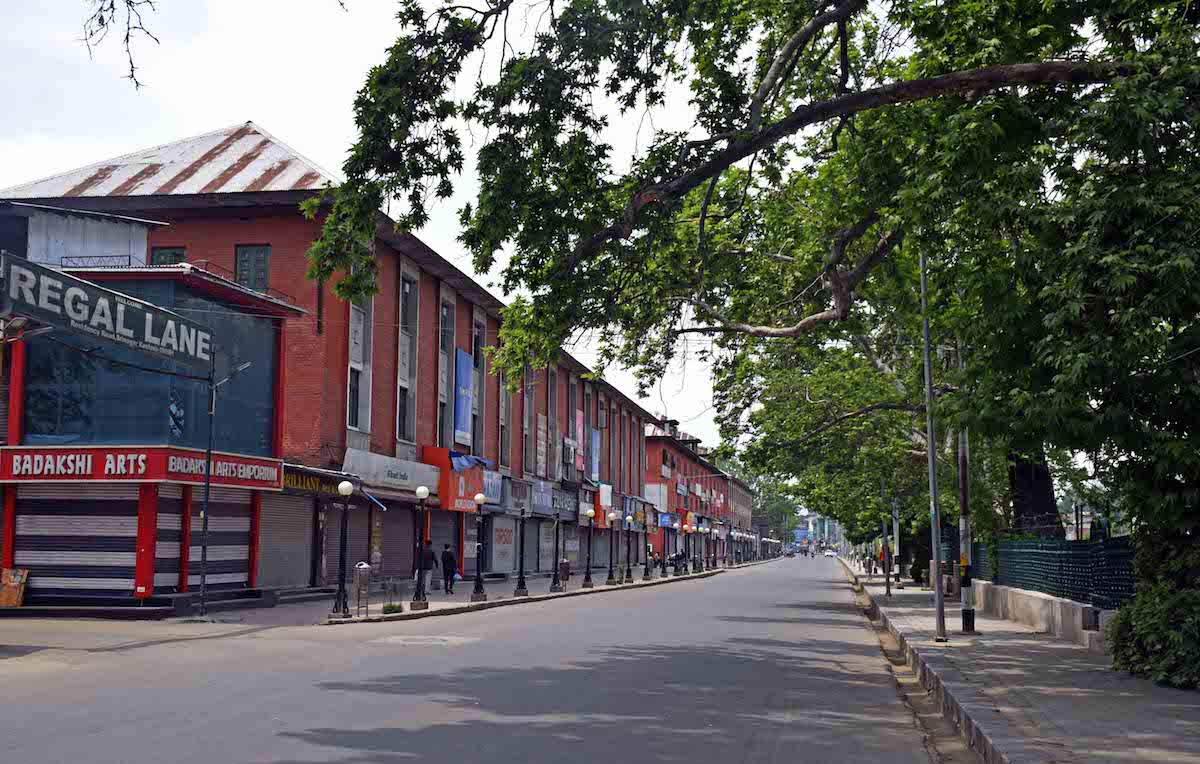
By the time Faizan’s family got to know about his detention, it was too late. An FIR had been filed against them for violating the lockdown guidelines.
Since it was the last day of Ramazan, the detainees who were fasting were only given a glass of water to break their fast. “The washroom only had one tap, near the toilet. Those of us who wanted to drink water were forced to drink from there.”
Faizan witnessed a person who had gone to get a gas cylinder refilled and was brought to the police station along with the LPG cylinder.
Faizan’s parents were kept waiting outside the police station. After interventions from some influential people, Faizan was let go. The FIR now hangs around his neck like a noose.
Not Alone
But Faizan is not alone. It is a story shared by thousands of people in Kashmir. “There is so much of police harassment that it has reached lawlessness,” Mohammad Yousuf Tarigami, the spokesman of the apparently revived PAGD said. “For rumours, people are rounded up.”
In Sopore lives Muzamil, a hardware store owner. He was receiving frequent calls from his employees seeking their salary before Eid.

“I had gone to the shop to give my staff some money for Eid. I hadn’t even opened my shop properly when the police came and rounded us up,” Muzamil said.
Along with his two employees, Muzamil was kept in police custody for the whole day. Muzamil also grumbled about crowded lockups. “Police arrested us for ‘violating’ Covid protocols but ironically, we were locked up in a congested room, which had over twenty people at that time,” Muzamil remembers. “The Covid protocols and SOPs are only for the poor and the helpless.”
An Ideal Situation
Aware that an invisible virus is around and movement has consequences, the people have picked a lot of knowledge since the virus flew to Srinagar in March 2020. Only those people attempt breaching the lockdown who felt some kind of compulsion – people who earn the two meals on daily basis; people who are in desperate need to purchase something; people who are sought by somebody. Then there were sections that felt compelled to make certain things available.
Governments in evolved societies compensated the working class, which encouraged people to stay put at home. Countries not so rich but understanding their people better, helped them to have less exposure to situations where they can contract the infection.

In Jammu and Kashmir, certain sections were helped with minimal cash support. Lt Governor Manoj Sinha said the government provided relief to registered construction workers, ponywalas, palkiwalas, pithuwalas.
The information available suggests that the Jammu and Kashmir Building and Other Construction Workers Welfare Board has so far dispensed a cash of Rs 69 crore by crediting Rs 1000, per month to 349303 registered construction workers for two months. These workers are scattered across 20 districts of Jammu and Kashmir. This is perhaps the biggest outgo of relief from a single organisation.
At the same time, however, the Jammu and Kashmir tourism department extended help to four categories of hospitality professionals – Shikara Walla, Tourist Guide, Houseboat owners and Ponywalla. “It was supposed to be for one month, then for two months and now practically it has been paid for nine months and may go for two months more,” one insider in the tourism department said. “We have so far dispensed an amount of Rs 12 crore by extending this relief for nine months to 13115 units.”

The well-intended initiatives, however, were devoured by inflation and the significance of the relief evaporated. Now an LPG Cylinder costs Rs 950. Even this relief keeps more than 95 per cent of the population untouched. Barring a section of the hospitality sector, it skips urban poverty completely.
Given the fact that more than 96 per cent of the population is not directly employed by the government, the pressures are visible. People are desperate to make some earning.
The Vulnerable
The fruit vendors and street hawkers lining the Qamarwari-Parimpora road in Srinagar are a harried lot. Most of them say they had only two options– either to sell these small items or to beg.
But they refused to talk for fear of the police. Some hawkers on condition of anonymity confirmed cops damaged their fruits and weighing balances many times.
“Police usually comes and destroys our goods,” said a fruit seller from the area. “Only two days ago, police came and trampled upon my weighing balance, threw away my weights and scattered my fruit across the road,” he alleged.
Even though Fruit Mandi at Parimpora, Srinagar was open for work but the government did not allow the roadside vendors and hawkers to sell their fruits.
Faced with hunger, poor people who had no other means or resources to feed their families are forced to go out to earn.
“We are forced to go out every day. We cannot keep our families hungry. We have to earn for them,” said a fruit seller from Soura who alleged he was ruthlessly beaten by cops. He has recently removed the plaster around his leg.
Another vendor from Parimpora who was beaten and detained for two days for violating the lockdown said, “We are treated like animals.”
At least, three persons who were lodged at three different police stations confirmed overcrowding in lockups putting the detainees at an increased risk of contracting the virus. While the government issued orders for departmental stores to designate two employees for home delivery of grocery items, poor people like fruit sellers, roadside vendors who are confronted with a do or die choice were left to fend for themselves.
Protein and Vitamin C
Given the fact that Covid19 lacks a formal treatment and even a vaccine is no guarantee against the infection, doctors have been advising people to improve their protein intake and vitamin-C supplements. They have been advising a preference for food over medicine.
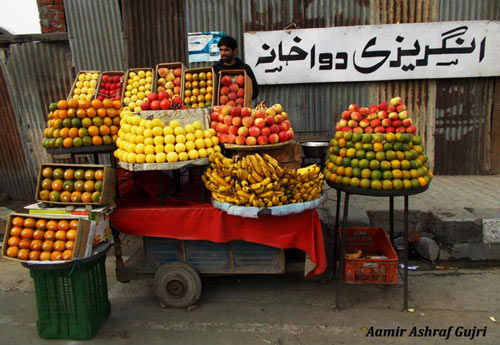
In Kashmir, poultry and chicken have remained the main source of protein. For Vitamin-C supplements, a section would ideally consume oranges, grapefruit, kiwi fruit and other things.
While the government would have countless meetings on Covid19 daily, never ever was this discussed? This resulted in people lacking access to these key essentials. Those affected by Covid found it incredibly hard to find mutton or chicken during the lockdown.
“When the vendor is able to buy fruit from us, only then can we sell. Government’s decision of keeping the mandi open while disallowing the roadside vendors to sell fruits made no sense,” Bashir Ahmad Bashir, President Fruit Seller’s Association said. “The fruit prices fell during the lockdown. The labour that we engaged in unloading fruit could not work properly. They and their families suffered heavily during the lockdown.”
The shortage of fruit like Kiwi that was being recommended by doctors witnessed a massive rise. “I used to get Rs 20 apiece and when doctors recommended me two pieces a day during Covid19, I failed to get. It was selling Rs 90 apiece,” a journalist, who wishes to stay anonymous, said.
Mutton Starvation
Kashmir has the notoriety of being the Wazwan country but all of a sudden mutton went missing. In certain localities, it was missing on Eid. “I had my father on an oxygen concentrator and my brothers were desperate to have some mutton for soup,” one government employee who lives in Qamarwari said. “We finally cooked eggs.” Haziq Tufail, from Sopore was forced to run errands to the market in search of mutton and poultry when his mother and his two sisters contracted Covid19. For days he couldn’t locate mutton or a poultry shop.

“We then gave them eggs we had at our home to compensate for protein,” Haziq said.
It was only after six days that Haziq could finally arrange mutton for his family.
Mehrajuddin Ganai, Srinagar’s prominent mutton importer said that mutton business fell by 80 per cent in lockdown. He said, even though the government had categorized milk, mutton and poultry as essential services, the orders were not fully implemented on the ground.
“There was a big contradiction between what government was saying and what it was doing on the ground.”
Many mutton dealers, Ganai alleged, were beaten and a few were arrested. This sector was already reeling under heavy loss due to successive lockdowns. The winter faceoff with the government over prices added to the losses.

Till March, Mehrajuddin said they would receive 40-50 trucks of sheep daily. “Now, we only receive 12-15 trucks in a day.”
Disposable Business
Shop owners formed a good chunk of “violators” who were fined, or arrested. But the mall owners and shopkeepers did not open out of greed to violate the SOPs in place to manage a genuine crisis. “We were forced to open because of public pressure,” one mall-manger said, pleading not to be identified. “For almost a month, we were only selling disposable plates, paper cups, napkins and sanitisers. How could we explain it to the police and if we did, will they accept?”
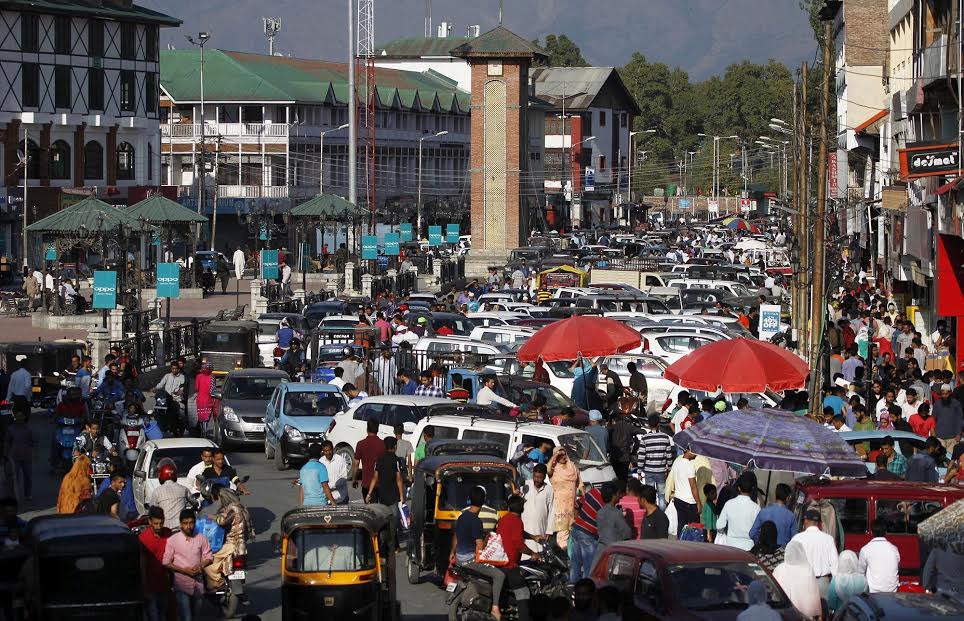 The manager said that the demand for these items was so huge that they had to replenish the stock three times. “What are the margins in it? This is all about society, its requirements. But how can we explain and to whom?” he said, insisting opening shops was more of social responsibility than business. There are, however, instances when the trading class tried to take the SOPs for granted. That happened in anticipation of Eid, which created a serious crisis in Srinagar.
The manager said that the demand for these items was so huge that they had to replenish the stock three times. “What are the margins in it? This is all about society, its requirements. But how can we explain and to whom?” he said, insisting opening shops was more of social responsibility than business. There are, however, instances when the trading class tried to take the SOPs for granted. That happened in anticipation of Eid, which created a serious crisis in Srinagar.
“I have 7000 sq ft mall serviced by 40 people who live around and not many people know that shops also need ventilation and if we do not run ACs and other appliances, it will get damaged,” Bilal Ahmad, one mall-owner said. “This relaxation was given by the system everywhere other than Kashmir. This is despite the fact that in last 32 months, we were closed for 22 months.”
Bilal said when the authorities would permit us to work for a day, they would have four-fold footfalls than routine thus contributing to the viral spread. “We told authorities but nobody took it seriously, they said we were greedy.”
Implementing Lockdown
The law enforcement agencies follow the brief from the top. The record that police created while enforcing the lockdown tells a big story. They would impose a fine to be paid on spot, register a police case and quick arrest, seal of the shop or seize the locomotives.
Between April 19, 2021, and June 18, 2021, the Jammu and Kashmir Police has created a record of sorts. It collected a fine of Rs 1,42,05,666 from 100822 people who allegedly violated the curfew restrictions imposed to contain the infection. It also registered as many as 2912 police cases and formally arrested 5282 people across 20 Kashmir districts.

Seemingly, most of these actions were taken in Srinagar. The city police Twitter handle gives some details. From the data available, the city police have registered at least 333 FIRs from April 29 till May 10, while 187 vehicles were seized till May 15. From June 2, to June 16, a fine of Rs 15,69,100 was recovered from at least 3694 people.
What is interesting is that the police are giving a receipt of the Indian Red Cross Society for every penny of fine they impose. Asked if they have authorised the police to collect money for them, the society officials said it has been ordered by the civil administration.
“We are imposing fine just for not wearing masks,” an additional Deputy Commissioner said. “Besides, this should be treated as a donation as this money goes to the poor and needy. If people wear masks, we will not seek anything.”
But should any government impose fines and register cases when most of the people have no income?
Silent Social Media
Unlike Kashmir, however, no such tell-tale commentary on the district police Twitter handles is visible anywhere outside Kashmir. There are no routine evening statements about the cases they register and the “revenue” they “generate” from violators of the curfew.

KL Image: Bilal Bahadur
On March 25, 2021, there is one tweet by district police Jammu: “Fine amounting to Rs 145100, imposed on more than 300 persons on for not wearing face masks in a special drive against COVID 19 guidelines violators in two consecutive days by Jammu Police.”
An unverified report said between April 1, to June 6, 2021, the district police Jammu registered 396 police cases, made 504 arrests, seized 70 vehicles, sealed 213 shops, nabbed 5252 people without masks and recovered a fine of Rs 23,66,550.
Rajouri district police tweeted on May 21: “From May 8 -10, 2021, 38 FIRs registered against violators of COVID protocols, 44 arrested, 141 persons fined, 21 vehicles seized, 17 commercial establishments sealed as per law. All are requested to adhere to Covid protocols.” In a Facebook post, Rajouri Police said that it had collected a fine of Rs 3,48,770 from violators from April 1 to May 1.
Similarly, on its Facebook page, updates uploaded by district police Kathua, from June 7 till June 12, reveal that it recovered a fine of Rs 99,800 while 231 people were challaned while no details on the number of FIRs were provided.
Samba Police on their Facebook page provided details of at least 13 FIRs it had lodged against violators from May 05 till May 27 under the disaster management act.
Ramban is the highway town and people who had to reach Srinagar or Jammu have to move through this. The administration is routinely issuing a statement in the evening about the cumulative fine it collected. By June 18, 2021, it was Rs 16,17,700.
Efforts to reach the district police officers failed. Despite contacting many senior police officials regarding the information on counter-Covid19 details, no officer responded. Many of them kept passing the buck from one officer to another, insisting they are not authorized to talk about it. One senior police officer from Jammu province explicitly asked to approach him through a “known” journalist in Jammu
Kashmir Police Chief, Vijay Kumar declined to comment.
Fewer Covid, More Penalty
To date, Jammu and Kashmir has reported 310688 Covid19 infections of which 296360 recovered and 4323 died. The remaining are in a different stage of healthy recovery. Ten districts of Kashmir account for 192708 infections and 2172 deaths. Interestingly Srinagar had more infections than Jammu but lesser people died of the disease because it was not exposed to some virulent versions of the virus.
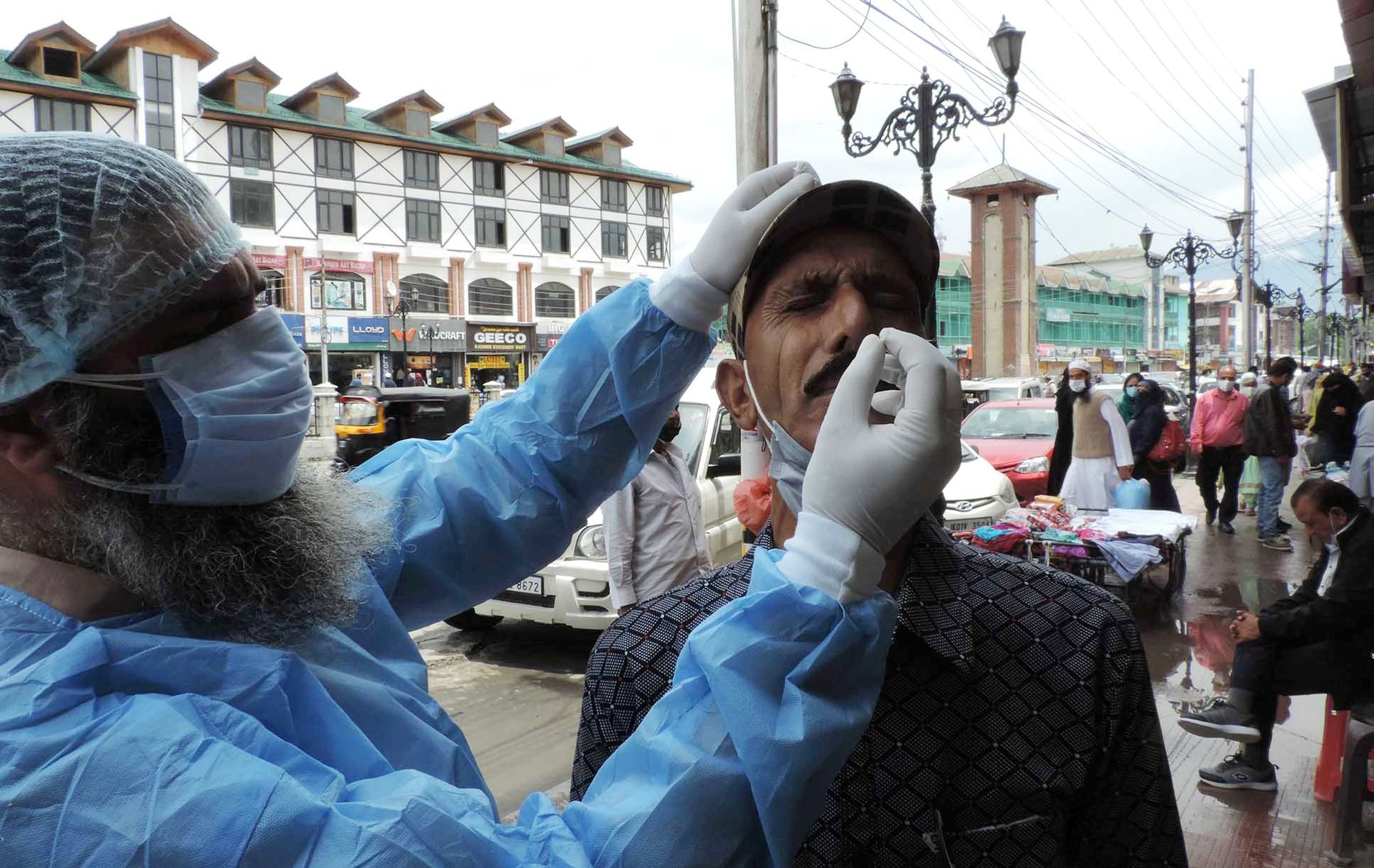
If the two sets of statistics will ever have a co-relation, it would mean a person was penalised for every two infections in Kashmir and the police registered two police cases for every Covid19 death. All these cognisable offences are for violating the Corona curfew.
Legal Battles
Mujeeb Andrabi, a Srinagar based lawyer who has handled these cases, said those people who have been booked during the lockdown are primarily accused of offences under the District Disaster Management Act, 2005.“Under this act, violators are booked for two offences,” Andrabi said.
“According to the first schedule of CrPC, an offence under section 188 of IPC is cognizable and violators can be booked for disobeying orders issued by a public servant, district magistrate in this case. Under this section, the district magistrate can issue an order or a circular, which restricts and bars the movement of the public, failing which the violators can be booked under the provisions of this act,” the lawyer said. “Under section 269 of Indian Penal Code, whoever has reason to believe his act is going to cause infectious disease dangerous to life shall be punished with imprisonment of either description for a term which extends to six months, or with fine, or both.”
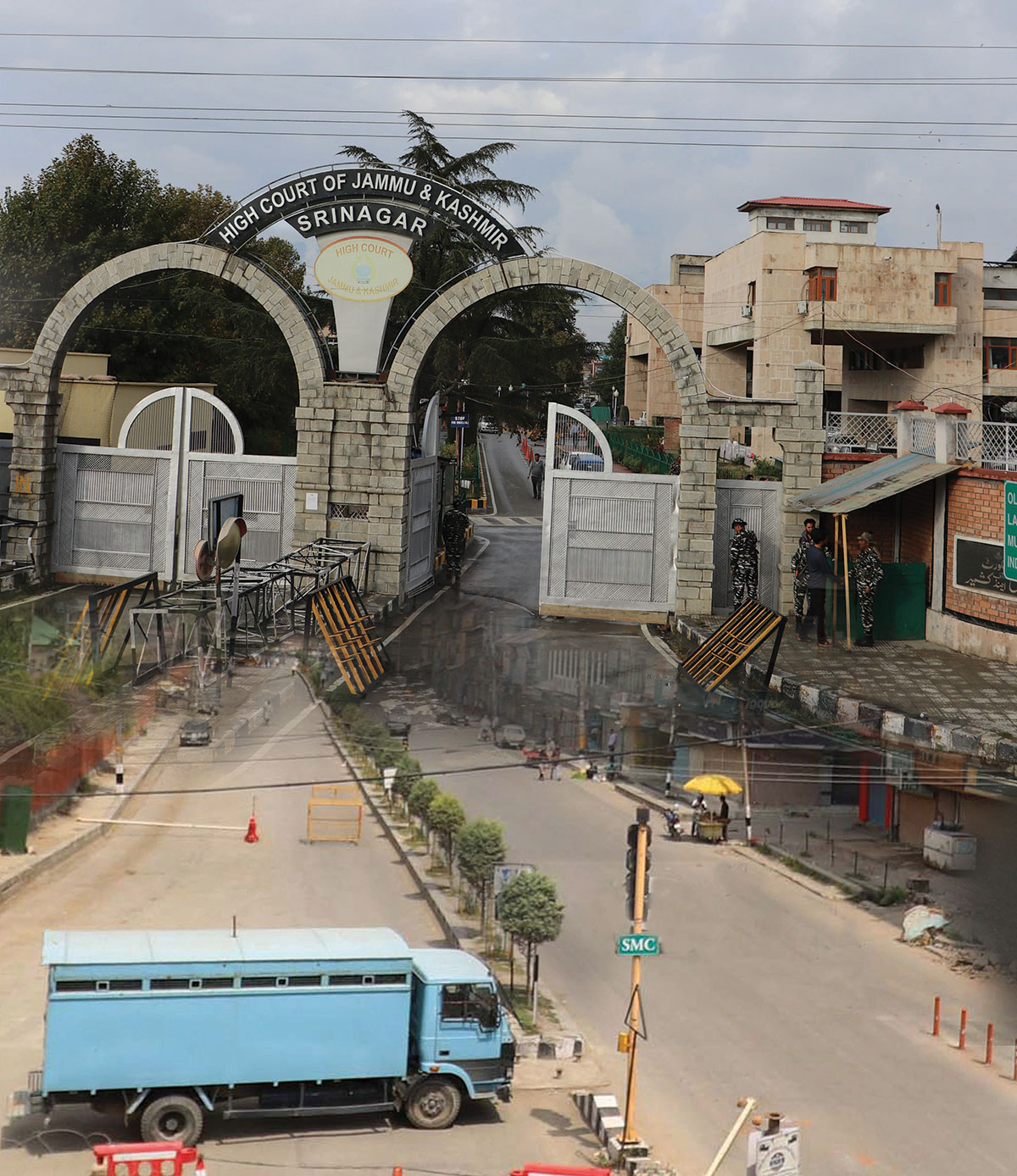
On the process of trial in the courts, the lawyer said that many such challans were presented before the Chief Judicial Magistrate (CJM), Srinagar, in the last more than a year. In some cases, the court imposed fines and closed the cases but there are several cases still going on in the courts.
“The duration of the trial in cases presented the courts depends on the party accused of violation of lockdown,” Andrabi said. “If the party is willing to pay the fine and settle the case, then fines are imposed and they are let go. Some people in certain cases avoid conviction and decide to fight the cases. Then it may take longer, ranging anywhere from one to ten years for the case to close.”















